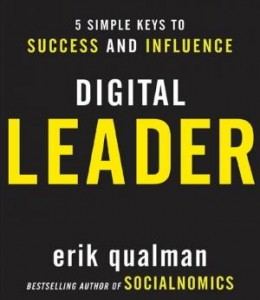 Notoriety used to give you a chance to be immortalized with a postage stamp, but “now every single one of us has a digital stamp.” This is the opening statement of Erik Qualman’s new book: Digital Leader: 5 Simple Keys to Success and Influence. While Qualman’s previous book, Socialnomics*, analyzed the new challenges and opportunities that the social media re-segmentation and restructuring of the market are to present to businesses, Digital Leader focuses on what it means for each of us to be part of the “Glass House Generation,” and what it takes for each of us to become a digital leader – transform our digital footprint into a distinctive digital “stamp.”
Notoriety used to give you a chance to be immortalized with a postage stamp, but “now every single one of us has a digital stamp.” This is the opening statement of Erik Qualman’s new book: Digital Leader: 5 Simple Keys to Success and Influence. While Qualman’s previous book, Socialnomics*, analyzed the new challenges and opportunities that the social media re-segmentation and restructuring of the market are to present to businesses, Digital Leader focuses on what it means for each of us to be part of the “Glass House Generation,” and what it takes for each of us to become a digital leader – transform our digital footprint into a distinctive digital “stamp.”
Be on the stamp that everybody wants to find! The book is structured around an easy-to-remember acrostic. “Stamp” stands for the five habits of digital leadership:
- SIMPLE: success is the result of simplification and process
- TRUE: be true to your passion
- ACT: nothing happens without action—take the first step
- MAP: goals and visions are needed to get where you want to be.
- PEOPLE: success doesn’t happen in a vacuum
Each of the chapters provides examples and anecdotes illustrating the topic at hand. Most of them are taken from the analog world on purpose: You don’t need to be a digital native to become a digital leader. A leader is a leader, and anybody can become a digital leader. Social media is not some form of black magic that obliges you to become somebody you are not or do not want to become. Rather, it is an environment that invites you to find the quintessence of who you are and what you want to say in order to be understood and interesting. Make technology work for you! The content of leadership may not intrinsically be different from what it is in the physical world, except that you must make your messages even more zen in order to render them more effective as well as more universal (and show a heightened sensitivity to the diversity of the people that constitute your digital friends or followers). Leaders, whether analog or digital, define their goals, pick their fight, shape their paths in order to shape the path of others.
Your true personality is just a camera phone away from being discovered… Do digital citizens lose some of their identity or betray their passions as they clean up their act and expurgate their texts of sarcasm or any form of nastiness? Maybe. Maybe not, if social media is more than an outlet for your random stream of conscience. The world of social media is undergoing the same evolution as the early days of blogging that progressively went from a public psychoanalytic “Say everything” craze to a consummate art of edited spontaneity. “The digital revolution has connected our integrity and reputation in a way never seen before.” No need to lament and dream of a golden era when we could separate our personal and professional lives and fancy ourselves as healthy Jekylls and Hydes. “Your true personality is just a camera phone away from being discovered,” Qualman reminds us, echoing the Zuckerberg’s statement in The Facebook Effect: “Having two identities for yourself is an example of lack of integrity.” While it’s true that in the digital era, “someone is watching us all the time,” it’s also true it gives us the ability to work on our personal unity and confidence, “recreate” ourselves — to take leadership over own lives — while easily accessing a wide audience, connecting and engaging with people. We lead by empowering others and “grow as they grow.”
One of the remarkable qualities of the book is that it dispels the threat that social media still signify to many people. Qualman is not lecturing you into becoming social media addicts to survive. Instead, his tone is inviting: “Digital Leaders are Made—Not Born.” Any individual can thrive in the digital era by creating output that unites people instead of dividing them. A very good book! Very human.
*I wrote a post about Socialnomics at the end of 2009.

















